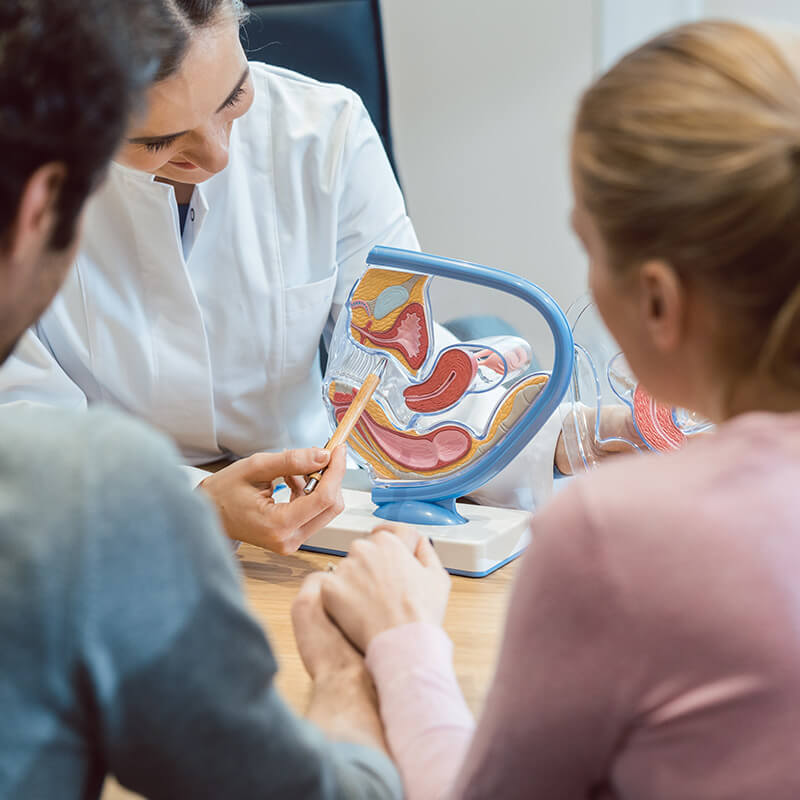
The uterus is a key component of your reproductive system, as it is the organ where a fertilized egg grows into a baby.
Therefore, you may experience fertility issues if the conditions of your uterus are not just right.
Abnormal growths such as fibroids, endometriosis or adenomyosis may be the cause of recurrent miscarriages or your inability to conceive, but the shape of your uterus may also be to blame. Women with abnormally shaped uteri rarely have symptoms other than recurrent miscarriages, so it is important to be examined by a doctor if you suspect you have one of the folloiwng uterus problems.
What is a uterine septum?
A septate uterus, or uterine septum, is where a muscular or fibrous wall, called the septum, separates the inside of the uterus. This is a genetic abnormality that occurs while your body develops in utero.
Your uterus began as two tubes that eventually fused to become one uterus. A uterine septum occurs when the tubes do not fuse effectively. You may have a partial septate uterus where the septum only extends part of the way into the womb, or you may have a complete uterine septum that extends to the cervix.
Treatment for Uterine Septum
A uterine septum can be corrected with a procedure called a septum incision. This procedure requires no skin incisions, as it is performed vaginally through the cervix. During a hysteroscopic septum incision your doctor will cut the septum which removes it and corrects the shape of your uterus. Learn more about hysteroscopy.
Uterine Septum & Fertility
Uterine septum is one of the most common types of uterine abnormalities, and it may make it difficult for you to become pregnant or carry a baby to term. In fact, the rate of miscarriage is considerably higher than in the general population, ranging from 20%-40%.
However, it is possible to improve your fertility with surgery. Following septum incision, between 50%-80% of women with a history of recurrent miscarriages will go on to carry a baby to term. If you have been unable to get pregnant due to a uterine septum, a uterine septum incision may increase your chances by up to 20%.

Heart-Shaped Uterus
A bicornate uterus, often called a heart-shaped uterus, is when the top of your uterus has an indentation, making the uterus the shape of a heart. While most women are able to experience healthy pregnancies with this abnormality it can result in a higher risk of preterm births or breech deliveries. Surgery is no longer indicated to correct a bicornuate uterus.
Arcuate Uterus
An arcuate uterus is fairly common and looks close to the shape of a normal womb. Similar to a bicornate uterus, there is an indent at the top, but it is less severe.
Uterus didelphys
Uterus didelphys is when there are two separate inner uterine cavities. Each cavity is attached to its own cervix, and there may even be two vaginas.
Unicornuate uterus
A unicornuate uterus is about half the size of a normal womb, and it is only attached to one fallopian tube. The shape forms what looks like a horn. Women with this condition may have two ovaries, but only one is connected to the uterus.

Diagnosing uterus problems
If you or your doctor suspects a uterine abnormality, one of the following tests may be used for diagnosis:
- A pelvic exam
- An x-ray of the uterus and fallopian tubes with dye contrast
- An ultrasound
- An MRI
Can I have a baby if I have uterus problems?
In most cases, women with uterine abnormalities are able to become pregnant and carry a healthy pregnancy. Due to the increased chance for preterm births, you may need to be monitored more closely during pregnancy to ensure the safety of you and your baby.
In the handful of cases where corrective surgery is necessary, you can expect your chance of becoming and staying pregnant to increase following surgery.
Ask an expert
If you have been diagnosed with an abnormally shaped uterus or if you have had recurrent miscarriages or unexplained infertility, make an appointment to talk with Dr. Stephan Krotz, an expert in fertility. Call us today at 713-401-9000 to schedule your fertility evaluation.
